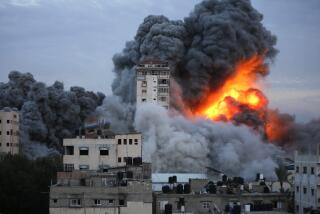U.N. Inspectors Find Iraqi Missile Research
- Share via
WASHINGTON — United Nations inspectors last month found fresh evidence that Iraqi engineers are continuing to conduct research work related to the development of banned long-range ballistic missiles, according to U.N. and U.S. officials.
The evidence consists of a software package that the inspectors copied from Iraqi computers, which Iraq apparently obtained illegally after the 1991 Persian Gulf War and has been using to simulate the launch and likely trajectory of such missiles, U.N. officials said.
The U.N. officials said the software could be used by Iraq to help develop new missiles with a range of up to 985 miles, or long enough to reach any country in the Middle East and even some of Europe. The officials added, however, that they have no evidence Iraq is constructing such missiles now.
“It is another indication in Iraq of interest in long-range missiles, and that’s the fundamental problem for us,” Charles Deulfer, deputy chairman of the U.N. Special Commission on Iraq, said in a phone interview from New York.
The commission was established after the 1991 Persian Gulf War to oversee the elimination of all Iraqi weapons of mass destruction.
The officials spoke after the German newspaper Frankfurter Allgemeine Zeitung first disclosed the new evidence of Iraq’s work on banned missiles and said the United States was considering military retaliation.
However, U.S. officials said no such action is planned.
Under U.N. Security Council rules, Iraq is barred from working on any missiles capable of flying more than 93 miles. But it has been caught developing such weapons or buying parts for them on two previous occasions, according to the U.N.
Shortly after the Gulf War, it conducted illicit tests of SA-2 antiaircraft missiles that were procured before the conflict and modified to hit ground-based targets.
More recently, Iraq illicitly imported several crates of gyroscopes extracted from long-range ballistic missiles designed for launch from submarines.
U.N. officials said the new discovery comes on the heels of several recent moves by Iraq to defy the U.N. Special Commission.
Swedish diplomat Rolf Ekeus, the commission’s chairman, said in Washington last week that Iraq still has failed to account for all of the ballistic missiles it acquired or built before the war, and that it also has refused to supply the commission with accurate accounts of its poison gas and germ warfare programs.
He also said that “we see . . . arrogance and nonchalance on the Iraqi side,” provoked by an expectation in Baghdad that the commission’s complaints about its noncompliance with U.N. rules will be “solved through political fatigue and attrition” in the Security Council.
More to Read
Sign up for Essential California
The most important California stories and recommendations in your inbox every morning.
You may occasionally receive promotional content from the Los Angeles Times.













